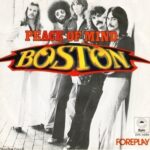 Long before irony, angst, and digital noise defined the soundtracks of everyday life, Boston’s “Peace of Mind” offered something revolutionary — sincerity. Released in 1976 as part of the band’s monumental self-titled debut album, the song became a touchstone for an entire generation seeking balance between ambition and meaning. It wasn’t just a rock song; it was a declaration of perspective, a guitar-driven sermon about rejecting the rat race and embracing one’s own sense of purpose.
Long before irony, angst, and digital noise defined the soundtracks of everyday life, Boston’s “Peace of Mind” offered something revolutionary — sincerity. Released in 1976 as part of the band’s monumental self-titled debut album, the song became a touchstone for an entire generation seeking balance between ambition and meaning. It wasn’t just a rock song; it was a declaration of perspective, a guitar-driven sermon about rejecting the rat race and embracing one’s own sense of purpose.
More than four decades later, “Peace of Mind” still resonates. Its shimmering harmonies, pristine guitar tones, and unshakable optimism embody a moment when rock could sound both powerful and pure. The song captures a universal yearning — that desire to slow down, look around, and ask, “Is this all worth it?” At its core, it’s about finding tranquility amid the grind — a message that remains timeless.
The Birth of a Rock Ideal
By the mid-1970s, rock was in transition. The psychedelia of the late ’60s had given way to heavier riffs, sprawling arena shows, and a new focus on precision musicianship. Amid that evolution, Boston emerged as an unlikely phenomenon — a studio project masterminded by MIT-trained engineer and guitarist Tom Scholz.
“Peace of Mind,” like most of the Boston album, was recorded largely in Scholz’s basement studio in Watertown, Massachusetts. It was a technical marvel for its time — a homegrown masterpiece built through sheer dedication, homemade gear, and meticulous craftsmanship. Scholz wasn’t just a guitarist; he was an audio architect, layering guitars and vocals with mathematical precision until the sound gleamed.
The song’s creation was deeply personal for Scholz. Having spent years working at Polaroid as a product engineer while chasing his dream of a music career, he knew firsthand the struggle between career ambition and personal peace. “Peace of Mind” wasn’t an abstract philosophy — it was his lived experience, distilled into melody and harmony.
A Song Against the Machine
The lyrical heart of “Peace of Mind” is its quiet rebellion against corporate conformity. Opening with that iconic guitar riff — bright, clean, and instantly uplifting — the song establishes its tone before the lyrics even begin. When Brad Delp’s soaring voice enters, singing “Now if you’re feelin’ kinda low about the dues you’ve been payin’,” the message is immediately clear: this is a song for anyone tired of chasing someone else’s definition of success.
Scholz wrote from observation and frustration. In an era when the American Dream was increasingly tied to material gain and career ladders, “Peace of Mind” offered a counterpoint. It wasn’t anti-work — it was pro-balance. The narrator isn’t rejecting ambition; he’s redefining it.
“People livin’ in competition / All I want is to have my peace of mind.”
That line cuts to the core of the song’s message: that true fulfillment comes not from comparison or hierarchy, but from inner contentment. It’s an anthem for those who realize that constant striving often leads nowhere — a rock-and-roll meditation disguised as a stadium anthem.
The Sound of Perfection
Part of what makes “Peace of Mind” so enduring is its sonic clarity. The track is a masterclass in layering and balance, achieving a level of production quality that was decades ahead of its time. Every note, from the twin-guitar harmonies to the vocal overdubs, was meticulously crafted by Scholz.
The guitars shimmer with his trademark tone — a blend of crunch and clarity that would later define the “Boston sound.” It’s both heavy and hopeful, grounded and soaring. Scholz famously developed his own recording equipment and effects to achieve that pristine resonance, including early prototypes of what would become the Rockman amplifier.
Brad Delp’s vocals elevate the song to another dimension. His delivery is warm but powerful, channeling both the philosophical calm of the lyrics and the emotional lift of the melody. The harmonies — another Scholz specialty — stack like rays of sunlight, creating a sense of upward movement that mirrors the song’s theme.
Then there’s the solo: a melodic, almost vocal expression that avoids showboating in favor of emotion. Every note serves the song, underscoring its reflective optimism. “Peace of Mind” is technical mastery that never loses sight of the human soul at its center.
A Reflection of the 1970s Soul
Culturally, “Peace of Mind” landed at exactly the right time. The mid-’70s were marked by post-Vietnam disillusionment, economic instability, and generational questioning. People were searching for meaning beyond the traditional career paths and suburban ideals their parents had followed.
Rock music had already become an outlet for rebellion, but Boston offered something different — a softer form of defiance. Rather than rage or nihilism, “Peace of Mind” proposed clarity and calm. It wasn’t about tearing the system down; it was about rising above it.
That resonated deeply with young listeners. College students, blue-collar workers, and suburban dreamers alike heard themselves in the lyrics. The song spoke to anyone feeling the pressure to compete, achieve, and climb — only to find emptiness at the top.
“Peace of Mind” wasn’t just a soundtrack to the ’70s — it was a compass. It helped redefine success not as a title or paycheck, but as a state of being.
The Song That Carved a Legacy
When Boston was released in 1976, it became one of the best-selling debut albums in history. Songs like “More Than a Feeling,” “Foreplay/Long Time,” and “Smokin’” dominated radio, but “Peace of Mind” stood out for its philosophical core.
It climbed the Billboard charts, eventually becoming a staple of both FM rock radio and live concerts. But beyond commercial success, the song earned a place in the cultural consciousness. It was the kind of track that fans carried with them through decades of change — a reliable reminder of what really mattered.
As arena rock exploded, many bands chased Boston’s polished sound. Yet few captured the same balance of intellect and heart. “Peace of Mind” was both cerebral and soulful, scientific in its construction but spiritual in its impact.
The Duality of Tom Scholz
Understanding “Peace of Mind” requires understanding its creator. Tom Scholz was, by all accounts, a perfectionist and a visionary — a man who approached music the way an engineer approaches invention. His background in mechanical engineering from MIT shaped everything he touched, from the band’s recording process to its live sound.
Yet beneath that precision lay a deeply introspective artist. Scholz’s lyrics throughout Boston reveal a man wrestling with the tension between logic and emotion, ambition and serenity. “Peace of Mind” became his personal manifesto — a reminder to himself that even success could be hollow without balance.
After the band’s meteoric rise, Scholz famously retreated from the spotlight, spending years refining equipment and crafting new music on his own terms. He lived the philosophy he wrote about — rejecting the industry’s relentless grind for the sake of his own creative peace.
Philosophical Power Chords
It’s easy to overlook how radical “Peace of Mind” really was. Rock music had long been a vehicle for rebellion, but this song redefined rebellion as contentment. It’s not about escaping through destruction or indulgence — it’s about mastering your own inner chaos.
That message runs counter to the typical rock ethos of excess. While other bands celebrated rebellion through wild living, Boston’s rebellion was internal — the quiet strength to say “no” to meaningless competition and to find worth within.
Musically, that same duality plays out. The song’s riffs are driving but never aggressive, its energy uplifting rather than destructive. It’s the sound of confidence without arrogance — a rare achievement in a genre built on swagger.
Influence Across Generations
“Peace of Mind” left an indelible mark on rock’s DNA. The clean production and layered harmonies became the blueprint for countless bands that followed — from Journey and REO Speedwagon to Def Leppard and even modern groups like Foo Fighters.
More importantly, the song’s lyrical themes have aged beautifully. At a time when the world feels faster and more competitive than ever, its call for balance feels prophetic. Millennials and Gen Z listeners, facing burnout and constant comparison, find surprising comfort in a song written decades before social media amplified the pressure to perform.
The track has also maintained a strong presence in pop culture. It’s appeared in films, commercials, and television shows as shorthand for clarity, nostalgia, and optimism. But even stripped of its era-specific context, “Peace of Mind” remains deeply relatable — a meditation disguised as a guitar anthem.
The Human Connection
What truly gives the song its staying power is its emotional honesty. Despite the technical precision behind every note, “Peace of Mind” feels profoundly human. It doesn’t lecture or preach; it empathizes.
Brad Delp’s vocals are a key part of that humanity. His delivery makes the song feel conversational — a friend gently offering advice rather than a philosopher delivering a sermon. Delp’s warmth gives the lyrics an intimacy that transcends decades.
Listeners don’t just hear “Peace of Mind”; they internalize it. It becomes personal. For many fans, it’s the song that plays during life transitions — a graduation, a road trip, a quiet night of reflection. It’s the sound of someone realizing they don’t have to chase approval anymore.
Beyond Time and Trend
Unlike many 1970s anthems, “Peace of Mind” never feels dated. Its message and melody are universal. The guitars sparkle as vividly today as they did nearly fifty years ago, and the production still sounds astonishingly modern.
That timelessness is part of Boston’s genius. Scholz’s studio wizardry made the music sonically immortal, but it’s the philosophy behind “Peace of Mind” that keeps it spiritually alive. It’s a song that doesn’t just belong to the past — it belongs to anyone, at any age, looking for equilibrium in a world that demands constant acceleration.
Even as the band’s lineup changed and the music industry evolved, the song has remained Boston’s quiet anthem of truth. It’s not their flashiest song, but it may be their most profound.
The Legacy of Stillness
“Peace of Mind” has achieved something that few songs manage: it offers both escape and enlightenment. It doesn’t just take you out of your troubles for a few minutes — it gives you a way to reframe them.
That’s why it continues to inspire. It’s the kind of song that sits comfortably on a playlist next to Pink Floyd’s “Time” or Fleetwood Mac’s “Landslide” — songs that offer perspective as much as pleasure.
Every generation rediscovers it in their own way. Some hear it as a road song, others as a spiritual guide. But all recognize its purity. The song reminds us that even amid noise and competition, peace isn’t something to be found — it’s something to be chosen.
Final Thoughts: The Sound of Balance
Boston’s “Peace of Mind” stands as one of the great philosophical rock songs — not because it preaches grand ideas, but because it captures an everyday truth with elegance and power. Its message of self-awareness and calm resilience has only grown more relevant with time.
It’s easy to forget that behind the flawless production and technical wizardry was a man searching for stillness, and a band trying to communicate hope. That combination — intellect and empathy, ambition and humility — is what gives “Peace of Mind” its brilliance.
Tom Scholz built the song with circuits and strings, but its heart beats with human warmth. It’s both an anthem for the restless and a lullaby for the overworked. And as long as people keep chasing success without stopping to breathe, “Peace of Mind” will continue to echo — a reminder that true greatness often lies not in striving harder, but in simply being still.


